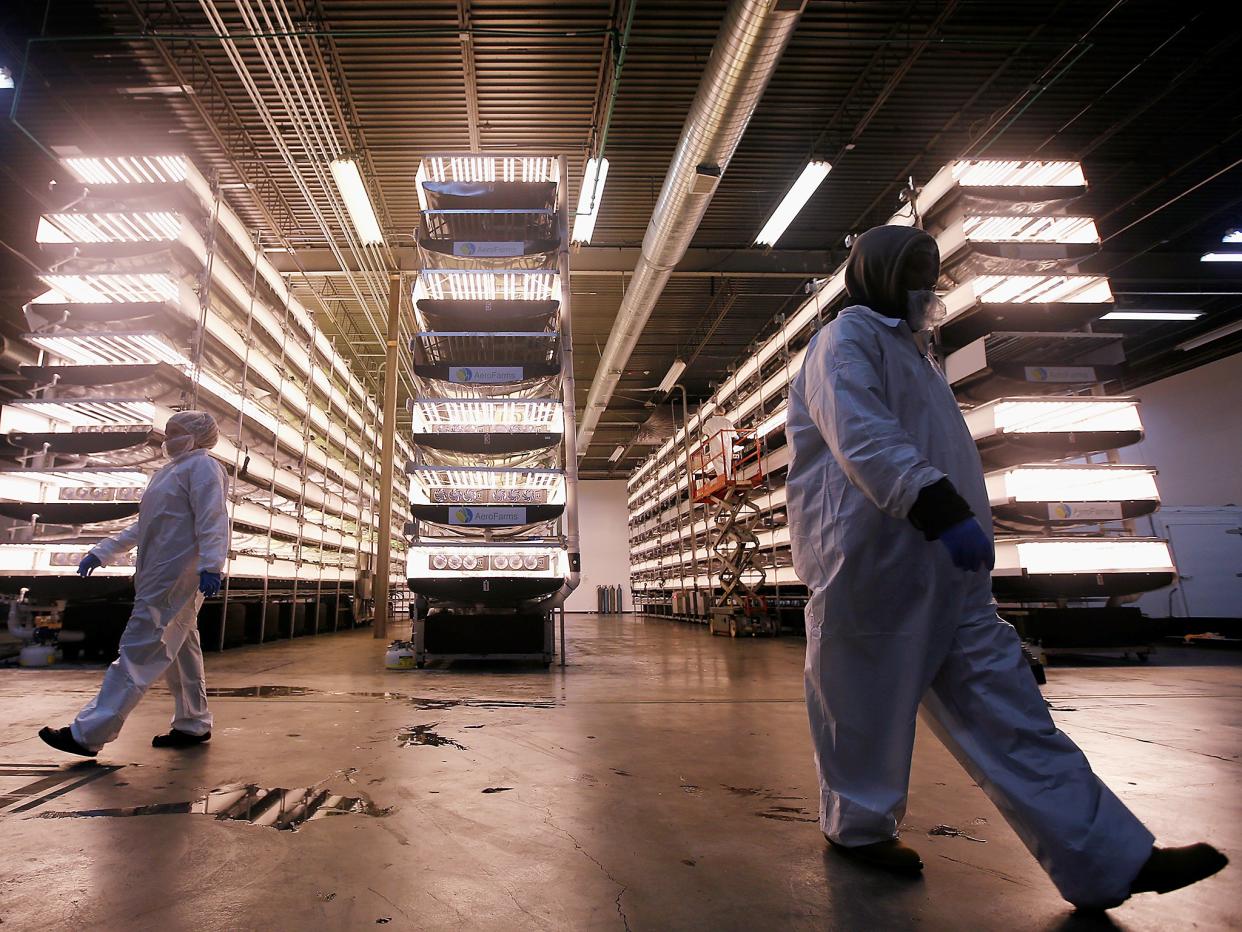Food is the missing piece of Boris Johnson’s green revolution

Workers walk near vertical farming beds at an AeroFarms Inc. facility in Newark, New Jersey
(Reuters)- Oops!Something went wrong.Please try again later.
The UK government is finally coming to terms with the urgent need for a cleaner future. Over a year after Theresa May committed to making the country net-zero by 2050, Boris Johnson set out a 10-point plan for a green revolution last month. As the UK prepares to host Cop26 next year, it is important that we show leadership on this issue. However, there is one major element missing, which is potentially transformative to the debate: food.
Like clean energy technologies that can reduce emissions, produce cleaner air, and improve people’s quality of life, food technologies – from alternative proteins to vertical farming – can help us produce food more sustainably, revitalise our countryside and provide increased choice of food at lower cost. And as we prepare to refashion our economy after Brexit, they provide an essential opportunity to stimulate industries and create new jobs.
The need for a radical transformation in the UK’s food system is urgent. It currently contributes to around 20 per cent of total UK emissions. Two-thirds of England’s rivers are not in good ecological condition, while our most productive soil is at risk of becoming unproductive within a generation due to loss of soil quality. And food poverty, like fuel poverty, affects thousands of working people.
The government has made some positive steps towards a more sustainable food system. The new Environmental Land Management Scheme, for example, will pay farmers for protecting the environment. Earlier this week the environment secretary announced a seven year transition plan, where farmers will see a switch from subsidies received through the EU’s Common Agricultural Policy (CAP) to subsidies to safeguard the countryside and grants to increase productivity. The government’s commitment to improve nature is certainly welcome.
But both Brexit and Covid-19 have brought concerns about food security to the fore. Already over 70 per cent of UK land is used by farmers for food production, yet we import over half our food. If we are to reliably feed a growing population, while handing vast areas of land back to nature, we must be much more radical.
Multiple technologies exist today that, if scaled up, can make significant strides in addressing the problems faced by our food system. They span the entire supply chain – from field to fork – and can help to improve methods of production, increase the quality of foods and reduce waste.
Fortunately, homegrown companies are at the forefront of many of these innovations. For example, UK-based vertical farming company Lett-us Grow has developed a technology that means producers can grow food indoors in upright stacks, using LED lighting, climate control and targeted nutrient delivery. The benefits of this approach range from using fewer inputs like water and pesticides, reduced waste, land use and more nutritional produce. It provides the potential to grow food all year round, and at the same time free up land to build housing or rewild, and improve national health.
In the words of Boris Johnson, we should be using the “powers of Britain’s invention” and beyond to “build back better”. To do this, the government must lead the transition. It is unlikely that market forces alone will enable food technologies to scale up at sufficient scale or pace to match the urgency of the challenge ahead.
As we invest in hydrogen, we must also invest in the technology to advance alternative proteins. As we create electric vehicle charging infrastructure to transform our transport systems, we must also invest in the infrastructure necessary to scale up vertical farms. And as we manage the transition to a green energy future by investing in jobs, we must also develop the skills of the future in our food system – those that combine traditional with frontier skills, and provide opportunities for young people all over the country.
Beyond the relevance to our net-zero commitments, scaling up these technologies will be vital to our role as post-Brexit Britain. By adopting a technology-first strategy for the food system we can provide a blueprint for the rest of the world to follow.
The ongoing National Food Strategy is due to set out a vision and a plan for our future food system. Scaling up transformative food and agriculture technologies must be at the heart of this. It is the missing piece in the discussion as we prepare for Cop26.
This needs to happen now. It has taken too many years for the government to get serious about the clean energy revolution. We cannot afford to make the same mistake with our food system. Let’s get on with it and build the markets that will dominate the future.
Hermione Dace is a policy analyst at the Tony Blair Institute for Global Change
Read More

